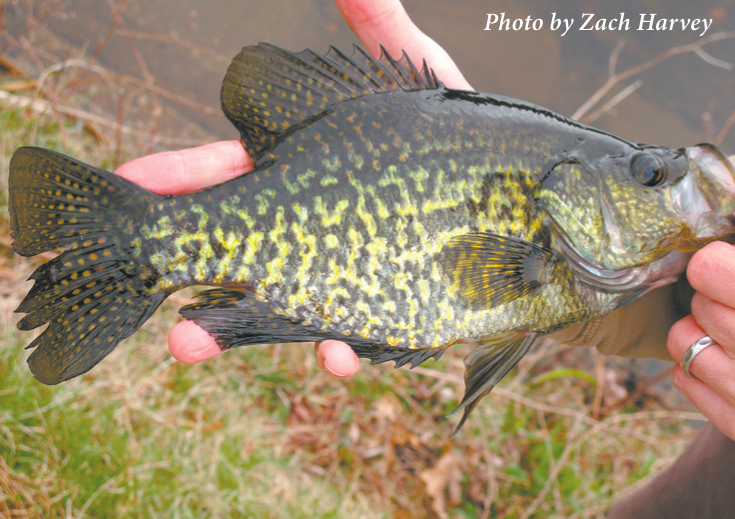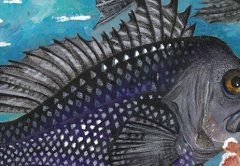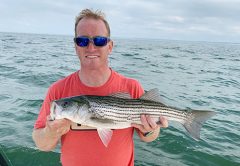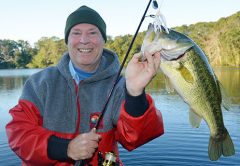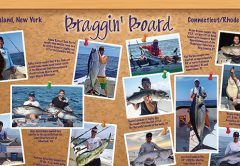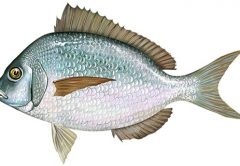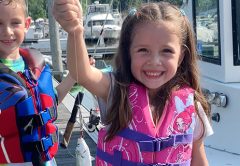Early Season Salvage
Fact: Our fishing seasons are shrinking. The same way a fish stock in decline will shrink toward the core of its territorial range—concentrate in smaller areas, usually for less time, we are hemorrhaging prime fishing time from both ends of the season. As if it weren’t hard enough to do a year’s worth of piscatorial damage in an 8-month Northeast season, now we’re trying to do the deed in around six months.
It’s complicated, naturally, because it’s not just one fishery and one cause, but rather the sum total of a great many small, incremental losses—spring cod, then winter flounder, river herring, tautog, and so on. One year you’re vowing to start earlier to take advantage of species X’s spring run, the next you’re shuffling around the marina wondering if it’s safe to make frozen mudslides before daytime air temps have cleared 55 degrees. Even if there were flounder around, the season is closed. Your boat, like a fiberglass memorial to delayed gratification, depreciates on its trailer (also depreciating) in your yard (also depreciating). No fishing sucks in various ways.
For years, I made smart-ass remarks about trout, treated largemouth specialists like the banjo-wielding simpleton in Deliverance. A couple years ago, after almost a week watching my neighbors capitalize on a bumper crop of stocked browns and rainbows every morning and night, I went and bought my freshwater license, and launched into a streak of trout-related skunkings that almost put me in the psych ward. I had it coming.
Finally, a couple weeks in, I heeded a whole laundry list of advice I’ve offered with booming conviction for 15 years. For one thing, even a hint of the sentiment that X species is beneath your level of angling prowess is a quick to not only catch nothing, but learn nothing from what should be a humbling experience.
For another, whatever your favorite target species, it’s amazing how much you can learn by targeting nearly anything else. Initially, I rationalized this new undertaking as preparation to take my daughter fishing—“I’m only doing this for her…” Soon enough, I dropped all explanation. For there is no bigger @#$hole than the guy who arrives and tells everyone why he fish—as though that required ornate explanation.
I’ve always found it amusing the number of offshore fishermen I’ve met who are unapologetic sweetwater junkies, and I now understand why that is. The biggest draw is the most basic: after steaming hundreds of miles to or along the edge of the continental shelf, the weather famously volatile and the fish-finding–endless variables—there’s something comforting about working a piece of water with boundaries. A pond’s occupants do not swim at bursts of 60 miles an hour, and they can’t move 20 miles overnight. They’ll crowd a shoreline, or drift off into deeper water, or gather around the mouth of a feeder stream, or suspend 30 feet off the bottom. But they cannot leave. Ha! I win!
In the ponds I fish are, according to my preference, small and close to home; the fishing’s not easy, but it’s conceptually simple the way I attack it, namely lugging not more than a four total lures. It’s not simple for the bass pros I know and pester for strategic advice, but it’s simple for me. I carry about four different offerings that are all I know: 4-inch floating Rapala stickbaits (in silver), #4 Mepps Aglia in-line spinners (silver blade, black bucktail), black Senkos, and one spinnerbait I resent and never use. I don’t know how well these match the waterbodies I frequent, but each has claimed decent bass, crappies and pickerel. I have one outfit which I refer to by its technical name: “freshwater rod”. You could cut the tension with a butter knife when I launch a borrowed shitball canoe next to a $60,000 custom bass boat with actual glitter in the clear coat, I assume. Whereas I can fit all my tackle in one pocket in a single pocket, these guys have somewhere between 6 and 137 rods apiece. The sight always makes me feel like real Buddhist material.
In truth, short-circuiting my serial-overthinking tendencies is the name of the game. My ponds feature a couple miles of shoreline, so there’s a finite number of possible combinations of what I throw and where I am. The fish I don’t worry so much about because I know they haven’t left. If I drill spots iknow, I can usually connect with something, anything, and feel satisfied that, while I won’t be interviewed for any features in Bassmaster Magazine, I’m not the worst knuckle-dragger who ever zig-zagged mightily to and fro in a creaky, heavy, unsightly canoe while I paddle furiously to make time.
I’ve lost a couple serious L. bass during what I believe is called the “pre-spawn,” at one of my top venues. I see why tournament bassmen wind on heavy mono or braided line to extricate huge largemouths from snarls of sunken timber along banks. I’d need heavier gear to properly handle these fish, but dumb as it sounds, I’m terrified of what might happen to my new all-time, desert- island top leisure activity if I start to pay too much attention. If I get serious about my sweetwater rigging, I’ll get more serious when I lose a good fish into the rhododendrons that overhang one of my pet banks by probably five feet. Before you know it, I’ll be showing up with a blue-glitter-flake reflective paint job on the canoe.
I put a premium on stealth when I fish freshwater. I guess it’s pretty fundamental to respect the places you fish—to treat them the way they treat you.
I also try to limit my arsenal to what I can fit into a pocket or two—a good discipline, I’m convinced, no matter what you target (or what you do for fun, for that matter). Three years along in my second foray into sweetwater casting, I’ve come to believe that the name of the game is giving good water its due. I feel taller and more coordinated knowing that on some level I’m casting at a captive audience.
It’s generally true that we learn best when we’re slightly out of our element, all our pores open, with nowhere else to be. Quick missions at high focus, one man, one rod, one lure, total focus. Strange that there are few other times when I am, in the same moment, so intent on the present and so totally relaxed.

